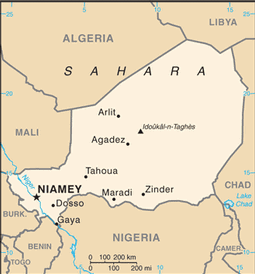Welcome to the Virtual Education Wiki ~ Open Education Wiki
Niger
Experts situated in Niger
Niger in a nutshell

Niger, officially the Republic of Niger, is a landlocked country in Western Africa, named after the Niger River. It borders Nigeria and Benin to the south, Burkina Faso and Mali to the west, Algeria and Libya to the north and Chad to the east.
Niger has a population of 16.4 million, mostly clustered in the far south and west of the nation. Its size is almost 1,270,000 km², making it the largest nation in West Africa,
The capital city is Niamey.
Niger is one of the poorest and least developed countries in the world, with over 80% of its territory covered by the Sahara desert, and much of the rest threatened by periodic drought and desertification. The economy is concentrated around subsistence and some export agriculture clustered in the more fertile south, and the export of raw materials—especially uranium ore. Niger remains handicapped by its landlocked position, poor education, infrastructure, health care, and environmental degradation.
Nigerien society reflects a great diversity drawn from the long independent histories of its several ethnic groups and regions and their relatively short period living in a single state. Historically, what is now Niger has been on the fringes of several large states.
The vast majority of the population practice Islam. A majority also live in rural areas, and have little access to advanced education.
The official language is French.
Education in Niger
The Ministry for Basic Education and Literacy is responsible for primary education, and the Ministry for Secondary, Higher Education, Research and Technology is responsible for secondary and tertiary education.
Schooling is free in Niger, but many areas do not have a school and, as a result, Niger has one of the lowest literacy rates in West Africa. Most of Niger's adults cannot read or write, and the literacy rate is only 13.6 percent.
The school system is based on the French model and consists of a primary school (Ecole Primaire), a secondary system (Lycée), and higher education system. Each of these is referred to as a cycle. [1]
School-level education
Pre-schoollevel Generally found only in urban areas, pre-school education is a fee paying system. Children can enter pre-school age three for three years. This currently accounts for less than 1% of eligible children.
Basic level Basic education consists of two cycles. The first lasts for six years (grades 1 to 6) and is for children from the age of six. The object of basic cycle 1 is to prepare the child either for active life or entry into basic cycle 2. This culminates in the award of either the Basic Cycle One Certificate (Certificat de fin du Premier Cycle) or a Franco-Arab Elementary Certificate (Certificat d’Etudes Primaires Elémentaires Franco-Arabe).
Basic cycle 2 also constitutes the first level of secondary education and commences age 11 to 13 for four years (grades 7-10). On successful completion the BEPC certificate is awarded
Middle Education This constitutes the second cycle of the general secondary level and consists of two streams: general education and technical/vocational education. This level lasts three years and education is provided by high schools, at the end of which is awarded either the general baccalaureate for the general secondary stream, and the technical baccalaureate for the middle technical stream.
Further and Higher education
Universities in Niger
- Abdou Moumouni University in Niamey
- Islamic University of Niger in Say
Polytechnics in Niger
Colleges in Niger
- The Niamey College of Education (École Normale Supérieure, ENS)
Education reform
Administration and finance
Quality assurance
Information society
ICT in education initiatives
From the 2007 Infodev ICT in Education report by Osei Tutu Agyeman [3]
Virtual initiatives in schools
Virtual initiatives in post-secondary education
Agence Universitaire de la Francophonie
The AUF has established a Campus Numérique (learning centre) in the Abdou Moumouni University in Niamey.
The digital campus contributes to the construction and consolidation of:
- Fostering scientific cooperation;
- Forming of future development actors;
- Supporting research and excellence;
- Sharing expertise
The digital campus provides:
- Training rooms where students and professionals come to attend distance learning sessions and face-to-face training;
- A resource centre with teachers and technical resources for providing science in the French language, including online courses and e-journals;
- Access to international databases and online scientific papers;
- A space for self-service Internet use and resources for self-training;
- Video-conferencing and IP telephony which allows for the organization of conferences and lectures.[4]
The African Virtual University
The AVU has adopted the Abdou Moumouni University in Niamey as one of five Francophone universities in its distance learning programme. The centres are provided with VSAT Internet connection, PCs and servers, televisions, and video-conferencing facilities. The courses are delivered over the internet, video and video conferencing with the help of local tutors to assist students.